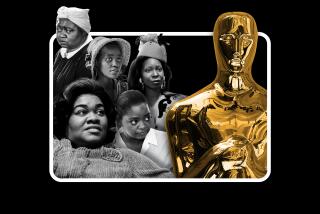TV REVIEW : ‘The Woman Who Loved Elvis’: Return to Sender
- Share via
It sounded great on paper, this idea of Roseanne Arnold playing a persecuted Elvis freak in a teleplay by proto-feminist author Rita Mae Brown. But ABC’s “The Woman Who Loved Elvis” (Sunday at 9 p.m. on Channels 7, 3 and 10) is surprisingly stiff at every turn, a TV picture that’s all too self-conscious about what small amount of swivel it has in its hips.
Arnold plays a small-town Iowa mom who’s made her front porch a literal shrine to Elvis and hasn’t skimped on decorating the living room either. She’s required to spout quasi-religious slogans like “He died for the love of us, and our love for him” with a straight face because, in the script’s junior-psych analysis, her character grew up under strict church-going parents who turned her off to more traditional, less liberating deities. She also needs a perfect man to worship because she was run out on five years previous by her smolderingly sexy, hunka-hunka-burnin’ husband, played by . . . you know.
This sounds a lot more rich than it ends up under Bill Bixby’s by-the-book direction, which has less swing in its spirit than a Pat Boone remake of “Hound Dog.” Brown’s gender-cliche-correct script isn’t much, either. Between Arnold and her two young daughters, plus Cynthia Gibb as a perky social worker who’s just discovering her independence as a woman, and Sally Kirkland as Roseanne’s salt-of-the-earth best friend, the movie is full of Midwest gal-bonding, as patronizingly envisioned by Hollywood. By the time Kirkland’s loutish lover tells her to “stop being a goofy broad,” the picture is starting to feel like “Thelma & Louise” with its mouth washed out with soap.
The plot centers around whether Gibb and Kirkland will send their no-good men packing, whether Tom Arnold will stop being no good and ride his motorcycle back into the family fold, and whether Roseanne will get prosecuted for welfare cheating. The movie unambiguously endorses her penny-ante fraud, because--as we’re twice reminded--”That’s the thing about welfare: You can’t live on it and you can’t live off it.”
What it doesn’t endorse, unfortunately, is any sort of coherent world view about the cultural significance of Elvis, whose overpowering effect on Roseanne is finally seen only as a harmless quirk. She’s supposed to be a saintly eccentric who performs good deeds for the impoverished in the name of the Pelvis, but Arnold is a little too inherently sarcastic in her line readings to bring off the naivete necessary for her character’s messianic aphorisms. On its way to its predictably sentimental conclusion, though, the script conveniently smoothes out her character’s obsessional weirdnesses and pretty much abandons the Presley hook altogether.
The rock ‘n’ roll-loving Arnolds--who really ought to know better--aside, this soppy movie plays like it was made by people who loved Engelbert.
More to Read
The complete guide to home viewing
Get Screen Gab for everything about the TV shows and streaming movies everyone’s talking about.
You may occasionally receive promotional content from the Los Angeles Times.






